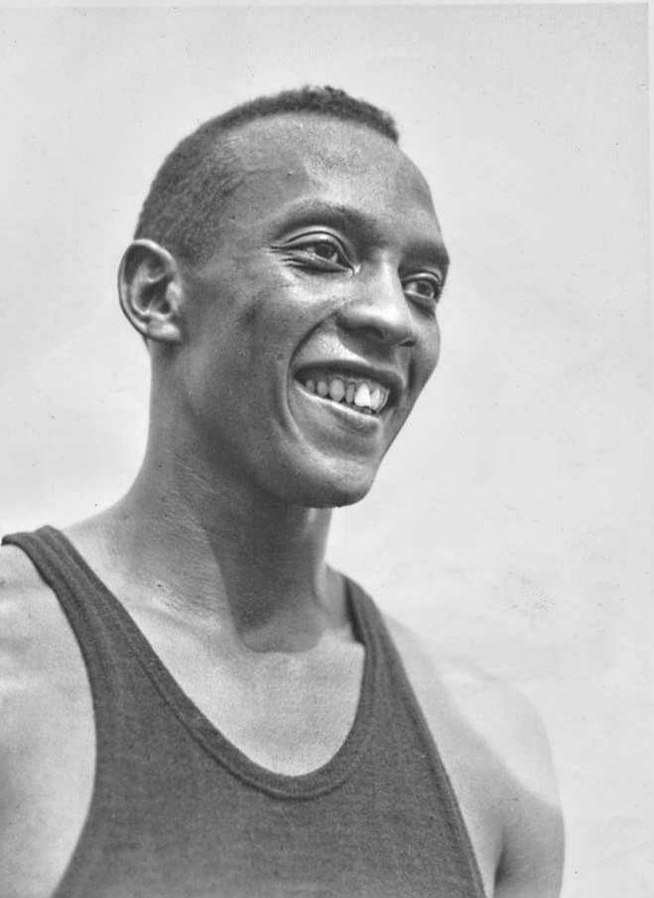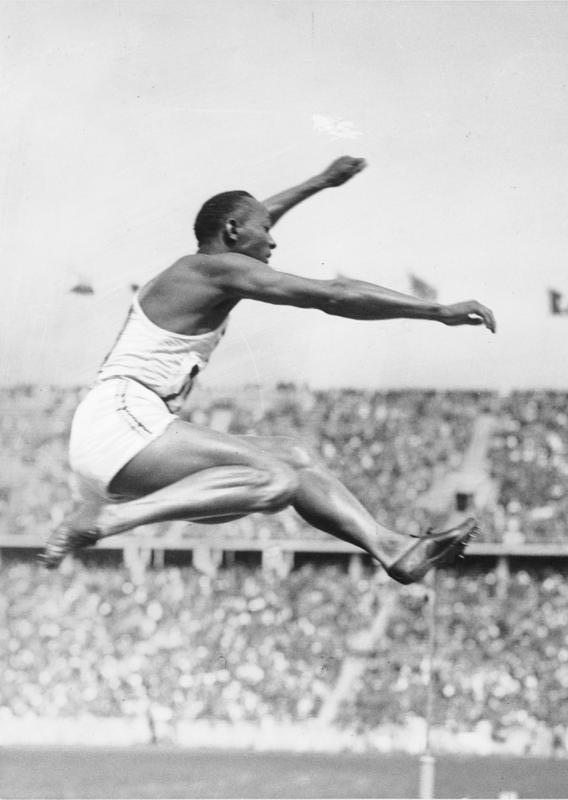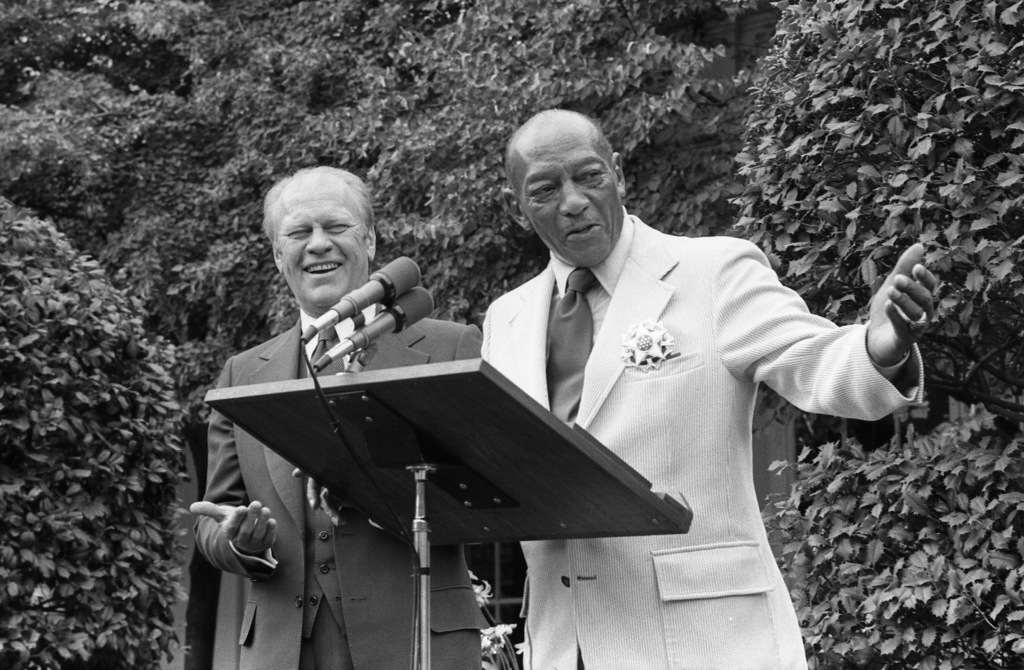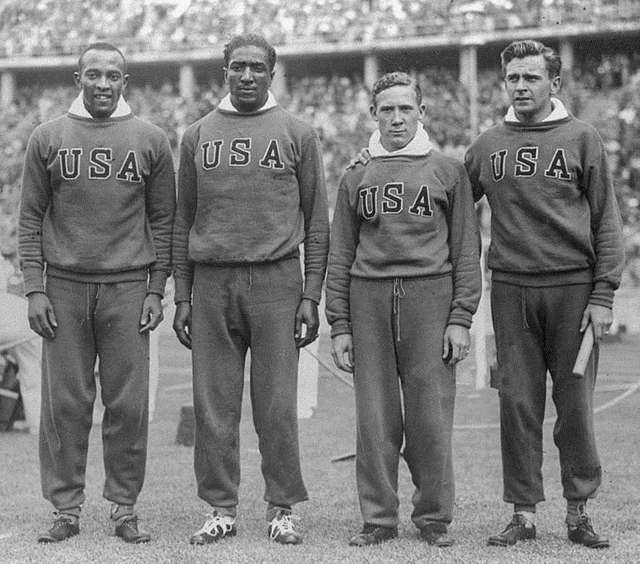In an era marred by racial prejudice and political unrest, one man's athletic prowess challenged the status quo. Jesse Owens, an African-American track and field athlete, not only shattered world records but also societal barriers.
This article explores Owens' life journey from his humble beginnings through to his triumphant performances at the 1936 Berlin Olympics, demonstrating how he transformed adversity into a beacon of inspiration for generations to come.
Key Takeaways
- Jesse Owens' story is a powerful testament to overcoming racial discrimination and adversity.
- His achievements shattered Nazi propaganda about Aryan supremacy and undermined racist ideologies prevalent at that time.
- Jesse Owens' global recognition highlighted the achievements of an African-American athlete, challenged racial prejudices and stereotypes, and showcased the power of sports in breaking barriers.
- His legacy transcends beyond athletics, inspiring individuals to defy adversity, symbolizing the triumph of the human spirit, and leaving a lasting impact on society.
Jesse Owens and his significance in sports and history
Jesse Owens, an iconic figure in sports and history, broke numerous records and defied socio-political barriers, leaving a significant impact on the world.

Known for his remarkable athletic prowess, Owens' achievement of four gold medals during the 1936 Berlin Olympic Games demonstrated a defiant stance against racial discrimination prevalent during his time. As one of the pioneering African American athletes on such a global platform, he challenged stereotypes about black inferiority perpetuated by Adolf Hitler's Aryan supremacy doctrine.
The importance of Jesse Owens transcends beyond sports; his victories symbolized hope for equality and inspired many future athletes to overcome societal obstacles. The profound societal impact made by Owens is still acknowledged today.
This discourse sets the backdrop for exploring Owens' early life and the struggles that shaped him into an emblematic figure in athletics.
Early Life and Struggles
Born into a family of sharecroppers in Alabama, the future track and field star faced numerous challenges during his early years due to racial segregation and economic deprivation. Henry Cleveland Owens and Mary Emma Fitzgerald nurtured their son's athletic abilities despite these obstacles.
His talent surfaced during high school years at East Technical High School in Cleveland, where he exhibited exceptional potential in track and field events. This prowess paved the way for a scholarship at Ohio State University, a rare opportunity for African-American athletes during this era.
However, Owens had to work part-time at a shoe repair shop to pay his living expenses while studying, emphasizing his resilience amidst adversity. This strength would be instrumental as he navigated towards global recognition in sports.
World Record and Rise to Prominence

Surmounting the challenges of his early life, this exceptional athlete began to gain national attention during his time at Ohio State University, where he shattered multiple track and field records. Known as James Cleveland Owens or Jesse Owens for short, he became famous for his athletic prowess in sprints and long jumps.
His rise to prominence was marked by key achievements:
- Setting three world records within 45 minutes during the 1935 Big Ten Championships.
- Winning eight individual NCAA championships between 1935 and 1936.
- Earning a spot on the U.S Olympic Team in 1936.
- Securing four gold medals at the Berlin Olympics.
Owens enjoyed athletic success, culminating in these historic victories that set him apart globally as an extraordinary athlete. This path led him directly into one of history's most politically charged sporting events—the 1936 Berlin Olympics.
The 1936 Berlin Olympics
The 1936 Berlin Olympics provided a platform for this prodigious athlete to showcase his exceptional skills and resilience against the backdrop of political tension and racial prejudice.

These games were intended by German Chancellor Adolf Hitler as an arena to demonstrate Aryan supremacy; however, Jesse Owens, an African American athlete, defied these beliefs with his outstanding performances. Owens' unprecedented success in winning four gold medals contradicted the narrative of racial inferiority perpetuated by Nazi ideologies.
His victories in the 100m, 200m sprints, long jump, and 4x100m relay challenged Hitler's propagandistic intentions for the Berlin Games on an international scale.
As this section concludes, it is valuable to delve further into the individual triumphs achieved by Owens during these historic Olympic Games.
Owens' Triumphs at the Olympics
Remarkable achievements were made at the 1936 Olympic Games by this African American athlete, whose performances in track and field events not only challenged but also shattered the racial prejudices prevalent at that time. Owens won four Olympic gold medals, firmly establishing his status as an Olympic champion. His triumphs served to defy resurgent Nazi Germany's ideology of Aryan supremacy.
Key victories included:
- The 100-meter sprint where Owens set a new Olympic record.
- His long jump victory distanced him from other competitors.
- The 200-meter race showcased his speed and endurance.
Each victory reinforced the message of equality on a global platform. These accomplishments spotlighted Owens' ability to confront adversity and overcome it with extraordinary grace and skill, leading into a discussion on confronting Nazi propaganda and racism.
Confronting Nazi Propaganda and Racism
In the face of widespread racial prejudice and Nazi propaganda, the exceptional accomplishments of this African American athlete at the 1936 Olympic Games served as a powerful rebuttal to notions of Aryan supremacy.
Jesse Owens' four gold medals belied Adolf Hitler's vision of Nazi Germany's domination in global athletics based on a misguided belief in racial superiority.
His victories not only shattered world records but also dismantled false ideologies perpetuating racism and discrimination.
Amidst confronting Nazi propaganda and racism, Owens' achievements underscored an indisputable fact: athletic prowess transcends race, nationality, or creed.
Henceforth, his triumphs reverberated beyond the confines of the Olympic games, engendering profound implications for society at large—providing an apt segue into examining his enduring legacy and impact.
Legacy and Impact
Groundbreaking accomplishments in the 1936 Olympic Games, credited to this distinguished African American athlete, have left an enduring legacy that continues to challenge and dismantle racial prejudices and stereotypes. Jesse Owens' gold medal victories not only defied Adolf Hitler's Aryan supremacy myth but also confronted racism on a global stage.
- Why Jesse Owens is famous extends beyond his athletic prowess; it lies significantly in his courage to challenge prevailing racial ideologies.
- How did Jesse Owens change the world? His triumphs became a symbol of hope for many marginalized communities, propelling societal changes toward equality.
- What is Jesse Owens known for? He is recognized as an iconic figure during Black History Month, celebrating resilience and cultural pride.
Transitioning into subsequent sections, the narrative will explore Owens' experiences post-Olympics.
Life After the Olympics
Following his illustrious victory at the 1936 Olympic Games, the esteemed athlete faced a new set of challenges and experiences in his personal and professional life. The phase termed as 'life after the Olympics' signified a shift in Jesse Owens' athletic career, marked by both triumphs and tribulations.

Despite being celebrated worldwide as a successful athlete, he struggled to maintain financial stability due to the racial discrimination prevalent during his time. However, Owens managed to carve out a unique path for himself beyond sports, dabbling in various ventures, including public speaking and entrepreneurship.
His resilience in facing adversity remained steadfast throughout the rest of his life. This section provides a glimpse into Owens' post-Olympic journey, paving the way for understanding how such experiences contributed to him becoming an enduring inspiration.
Jesse Owens' Enduring Inspiration
Despite the hurdles and challenges post-Olympic life presented, the enduring inspiration from this notable athlete's resilience continues to significantly influence countless individuals globally. Jesse Owens' triumph of the spirit is epitomized not only in his defying adversity on the world stage but also in his commitment to helping others rise above their circumstances.
This enduring inspiration has multiple facets:
- His world records serve as benchmarks for aspiring athletes.
- These records demonstrate his exceptional skill and dedication.
- They inspire many to strive for similar feats.
- His demeanor portrayed a man who remained humble despite worldwide recognition.
- His humility serves as a model for those achieving success.
- It emphasizes character over accolades.
This narrative of endurance, perseverance, and humility sets the stage for an exploration into Owens' contributions beyond athletic prowess: as a champion beyond the track.
A Champion Beyond the Track
The profound impact and significance of Jesse Owens' narrative extend far beyond his athletic achievements on the track.
His life, marked by triumph over adversity amid a racially charged era, offers invaluable lessons about resilience, perseverance, and dignity in the face of discrimination.
An analysis of Owens' accomplishments demonstrates not only his extraordinary physical prowess but also his indomitable spirit that continues to inspire generations across the globe.
Impact and importance of Jesse Owens' story
Jesse Owens' narrative holds significant importance as it serves as a powerful testament to overcoming racial discrimination and adversity on an international platform. The impact and importance of Jesse Owens' story is profound, illuminating the triumph of the spirit in defying odds.
- His perseverance despite racial prejudice epitomizes strength.
- As an American athlete, his victories shattered Nazi propaganda about Aryan supremacy.
- The global recognition he received served to undermine racist ideologies prevalent at that time.
- His humble demeanor and undeterred focus towards his passion for sports inspired generations.
The legacy left behind by Owens transcends beyond the realm of athletics. These instances reflect how he personified courage, resilience, and dignity while defying adversity on the world stage. This segues into learning from his life and achievements.
Lessons we can learn from his life and achievements
Transitioning from the examination of the impact and importance of Jesse Owens' story, attention will now be directed towards the lessons that can be gleaned from his life and achievements.

Jesse Owens, an African-American athlete who defied racial barriers to win four Olympic gold medals in 1936 Berlin Olympics, remains a pertinent embodiment of resilience and determination. This most impressive athletic achievement underlines a key lesson: triumph of the spirit is possible despite adversity.
The formidable challenges faced by Owens did not deter him; rather they fueled his commitment to excel. Thus, studying who is Jesse Owens teaches invaluable lessons on perseverance, courage in face of discrimination, and dedication towards personal goals.
These lessons are testaments to the transformative power individuals possess when driven by unwavering spirit and ambition.
Frequently Asked Questions
What were some of Jesse Owens' personal hobbies outside of track and field?
Ironically, despite his athletic prowess, Owens enjoyed the calm hobbies of reading and playing pool. These provided intellectual stimulation and leisurely relaxation, demonstrating his multifaceted personality beyond the rigorous discipline of athletics.
Can you elaborate on the nature of Jesse Owens' relationships with his family, friends or teammates?
Jesse Owens maintained strong familial bonds, being a devoted husband and father. His relationships with teammates were generally amiable, though he occasionally faced racial discrimination. Friendships flourished due to his charismatic, unassuming personality.
What were some of the challenges Jesse Owens faced in his personal life post-Olympics?
Post-Olympics, Owens faced numerous personal hardships, including financial struggles and professional marginalization. A lack of lucrative endorsements due to racial discrimination exacerbated these challenges, affecting his mental health and putting strain on familial relationships.
Can you provide insights into Jesse Owens' educational background and its influence on his career?
Jesse Owens, a beacon of hope in the world of athletics, attended Ohio State University, where he honed his track and field skills. This educational environment undoubtedly played an instrumental role in shaping his illustrious career.
Are there any notable incidents or stories about Jesse Owens' interaction with fans or the general public?
Noteworthy incidents of Jesse Owens' interactions with fans include his 1936 Olympic victory, where he received overwhelming public acclaim despite racial barriers. This highlighted Owens' ability to inspire and influence people globally.






